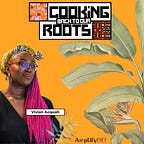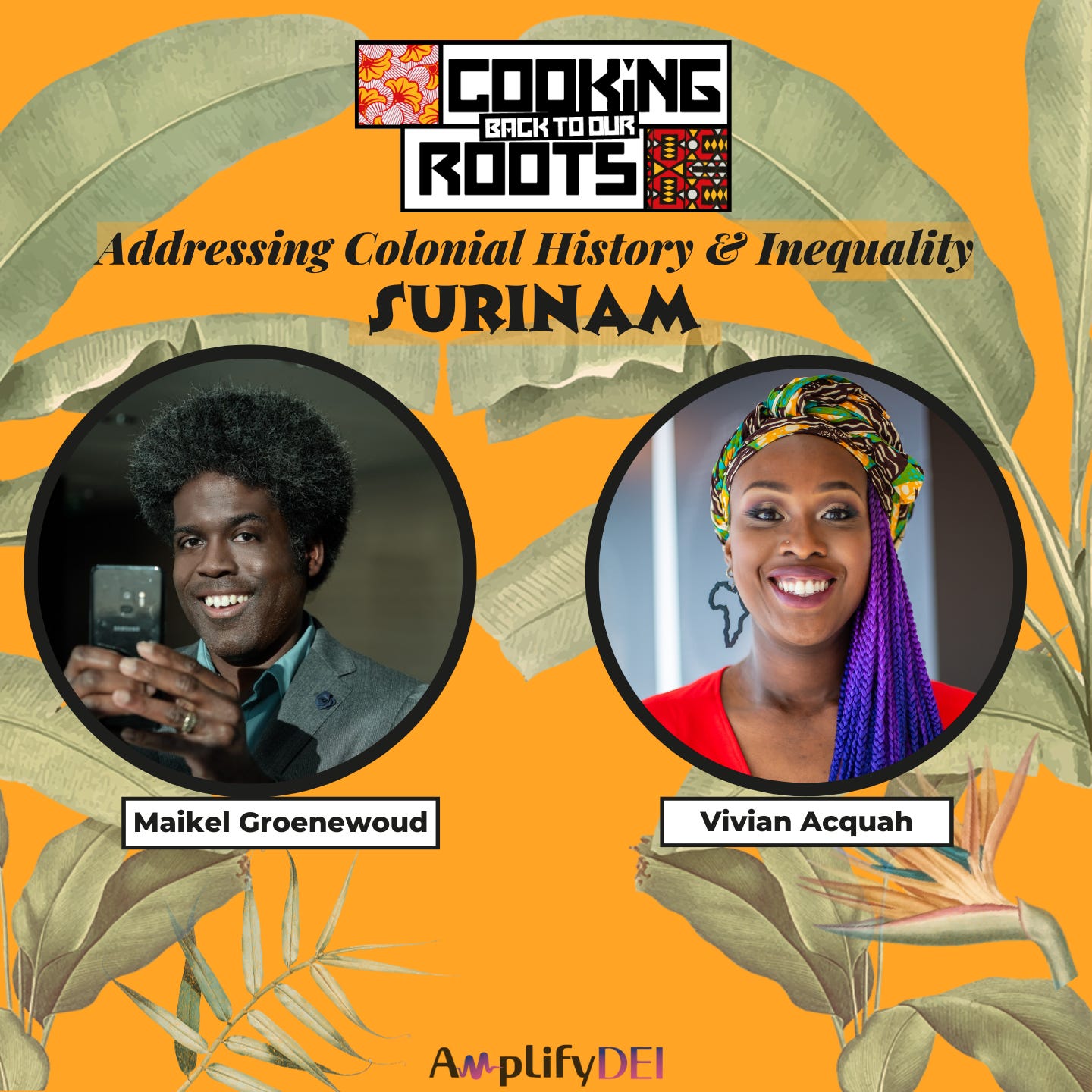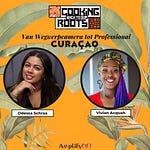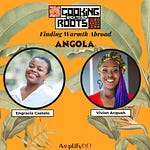Scroll naar beneden voor de Nederlandse tekst
In this episode of the Cooking Back to Our Roots podcast, host Vivian Acquah (Certified DEI Trainer/ Consultant) engages in a thought-provoking conversation with Maikel Groenewoud (Data & AI Leader | Global Digital Equity Advocate), who has a passion for societal and historical reflection.
Their discussion offers deep insights into the impact of racism, the intersection of technology and societal dynamics, and the personal resonance of cultural identity. Here, we delve into the key takeaways from their conversation and the broader implications for understanding and addressing colonial history and inequality.
The Complexity of Racism and Historical Trauma
Maikel Groenewoud's experiences highlight the multifaceted nature of racism, both historically and in the present day. He emphasizes the need for self-reflection and respecting others, even in the face of disagreements. Maikel's personal encounters with racism, from both white and black individuals, shed light on the pervasive and damaging effects of discrimination, irrespective of its source.
The Impact of Institutionalized Racism
One of the most striking aspects of Maikel's narrative is the institutionalized nature of racism, particularly within the education system. His accounts of being perceived as incompetent due to his roots and encountering blatantly racist teachers underscore the enduring impact of racism on individuals, particularly during their formative years. These experiences serve as a poignant reminder of the lasting effects of systemic discrimination in educational and professional environments.
The Intersection of Technology, Ethics, and Societal Dynamics
Maikel's expertise in data and AI provides a unique lens through which to view societal and historical elements. He stresses the importance of incorporating societal, historical, and ethical considerations in technology, underscoring the need for responsible and equitable solutions. By highlighting the complex interplay between technology and societal dynamics, Maikel encourages a holistic approach that acknowledges and addresses the historical and colonial underpinnings of societal structures.
Acknowledging Historical Trauma and Impact
Maikel's reflections on the ongoing impact of historical events, such as slavery and colonialism, demonstrate the enduring effects of historical trauma. His emphasis on recognizing and addressing the ongoing impacts of colonialism resonates as a call for collective acknowledgment and healing. Furthermore, the importance of inclusive storytelling and the need to showcase success beyond traditional career paths underscores the significance of amplifying diverse narratives and experiences.
Toward Collective Recognition and Healing
The dialog between Maikel and Vivian encapsulates the necessity of reckoning with historical trauma and the insidious normalization of racism. Their exchange serves as a poignant reminder of the imperative to challenge societal narratives, especially those that seek to erase or distort historical injustices. Through their candid and insightful discussion, Maikel and Vivian pave the way for broader conversations about recognizing and addressing the enduring impacts of colonialism, racism, and historical trauma.
Finding Resonance in Cultural Identity
Maikel's personal connection to his Surinamese roots and his appreciation for the podcast's celebration of the African diaspora resonate deeply. His depiction of cherished Surinamese dishes and his reflection on the difficulty of feeling rooted due to historical trauma and displacement underscore the profound and enduring connection between cultural identity, historical trauma, and resilience.
Final Thoughts
The conversation between Maikel Groenewoud and Vivian Acquah in the Cooking Back to Our Roots podcast offers a compelling and multifaceted exploration of racism, technology, and cultural identity. By delving into the complex intersections of these themes, they provide invaluable insights into the pervasive impact of historical trauma and the urgent need to dismantle white supremacy culture. Their conversation serves as a catalyst for broader discussions on acknowledgment, healing, and the vital importance of inclusive storytelling in fostering understanding and empathy.
Bio Maikel Groenewoud
Maikel Groenewoud is a Data & AI Leader who began his career at a policy research institute, after which he joined an international consulting firm. As a leader, he is focused on fostering a sense of belonging through values-driven and inclusive leadership. In his work, he operates at the intersection of technology, ethics, society, and history.
Bio Vivian Acquah CDE®
Passionate and driven, Vivian Acquah is a Certified Diversity Executive (CDE®) who is making waves in the world of workplace wellness and DEI. With a name that literally translates to "water," Vivian has become an extinguisher of fires related to DEI, helping clients such as Heineken, LinkedIn, Google, Indeed, Deloitte, Tibco, Cargill, Swift, Acrolinx, KLM, and Zalando.
Heri Heri
(klik hier voor de English version
Surinaamse Kippastei | Surinamese Chicken pie
Surinaamse Pindasoep
Nederlands
In deze aflevering van de podcast Cooking Back to Our Roots gaat host Vivian Acquah (Certified DGI Trainer/ Consultant) een tot nadenken stemmend gesprek aan met Maikel Groenewoud (Data & AI Leader | Global Digital Equity Advocate), die een passie heeft voor maatschappelijke en historische reflectie. Hun gesprek biedt diepgaande inzichten in de impact van racisme, het snijvlak van technologie en maatschappelijke dynamiek, en de persoonlijke weerklank van culturele identiteit. Hier verdiepen we ons in de belangrijkste punten uit hun gesprek en de bredere implicaties voor het begrijpen en aanpakken van koloniale geschiedenis en ongelijkheid.
De complexiteit van racisme en historisch trauma
De ervaringen van Maikel Groenewoud benadrukken de veelzijdige aard van racisme, zowel historisch als in het heden. Hij benadrukt de noodzaak van zelfreflectie en het respecteren van anderen, zelfs als er meningsverschillen zijn. Maikels persoonlijke ontmoetingen met racisme, van zowel witte als zwarte mensen, werpen een licht op de doordringende en schadelijke effecten van discriminatie, ongeacht de bron.
De impact van geïnstitutionaliseerd racisme
Een van de meest opvallende aspecten van Maikels verhaal is de geïnstitutionaliseerde aard van racisme, vooral binnen het onderwijssysteem. Zijn verhalen over het feit dat hij als onbekwaam werd beschouwd vanwege zijn afkomst en dat hij in aanraking kwam met uitgesproken racistische leraren, onderstrepen de blijvende impact van racisme op individuen, vooral tijdens hun vormingsjaren. Deze ervaringen dienen als een aangrijpende herinnering aan de blijvende effecten van systemische discriminatie in educatieve en professionele omgevingen.
Het snijvlak van technologie, ethiek en maatschappelijke dynamiek
Maikels expertise in data en AI biedt een unieke lens om maatschappelijke en historische elementen te bekijken. Hij benadrukt het belang van het integreren van maatschappelijke, historische en ethische overwegingen in technologie en onderstreept de noodzaak van verantwoorde en gelijkwaardige oplossingen. Door de complexe wisselwerking tussen technologie en maatschappelijke dynamiek te benadrukken, moedigt Maikel een holistische benadering aan die de historische en koloniale achtergronden van maatschappelijke structuren erkent en aanpakt.
Erkenning van historisch trauma en impact
Maikels reflecties op de voortdurende impact van historische gebeurtenissen, zoals slavernij en kolonialisme, tonen de blijvende effecten van historisch trauma. Zijn nadruk op het erkennen en aanpakken van de voortdurende gevolgen van het kolonialisme resoneert als een oproep tot collectieve erkenning en genezing. Verder onderstreept het belang van het vertellen van verhalen aan iedereen en de noodzaak om succes te laten zien buiten de traditionele carrièrepaden het belang van het versterken van diverse verhalen en ervaringen.
Naar collectieve erkenning en genezing
De dialoog tussen Maikel en Vivian vat de noodzaak samen van het verwerken van historische trauma's en de verraderlijke normalisering van racisme. Hun uitwisseling is een aangrijpende herinnering aan de noodzaak om maatschappelijke verhalen in twijfel te trekken, vooral die verhalen die historische onrechtvaardigheden proberen uit te wissen of te verdraaien. Door hun openhartige en inzichtelijke discussie banen Maikel en Vivian de weg voor bredere gesprekken over het herkennen en aanpakken van de blijvende gevolgen van kolonialisme, racisme en historisch trauma.
Weerklank vinden in culturele identiteit
Maikels persoonlijke band met zijn Surinaamse wortels en zijn waardering voor de podcast over de Afrikaanse diaspora resoneren diep. Zijn weergave van gekoesterde Surinaamse gerechten en zijn reflectie op de moeilijkheid om zich geworteld te voelen als gevolg van historisch trauma en ontheemding onderstrepen de diepe en blijvende verbinding tussen culturele identiteit, historisch trauma en veerkracht.
Tot slot
Het gesprek tussen Maikel Groenewoud en Vivian Acquah in de podcast Cooking Back to Our Roots biedt een meeslepend en veelzijdig onderzoek naar racisme, technologie en culturele identiteit. Door zich te verdiepen in de complexe kruispunten van deze thema's, bieden ze inzichten van onschatbare waarde in de alomtegenwoordige impact van historisch trauma en de dringende noodzaak om de cultuur van witte suprematie te ontmantelen. Hun gesprekken dienen als katalysator voor bredere discussies over erkenning, genezing en het vitale belang van verhalen vertellen om begrip en empathie te kweken.













